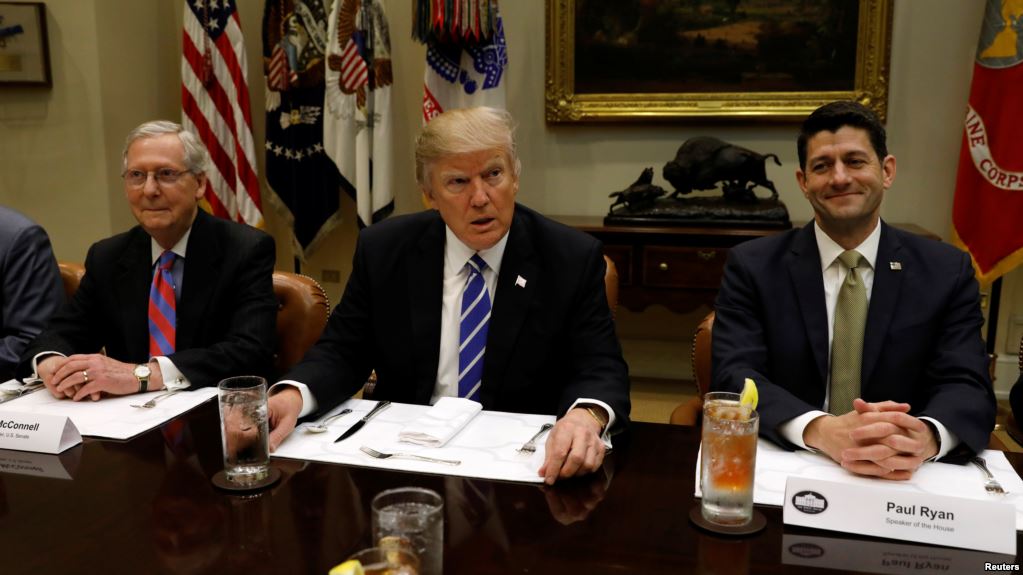US’ tax overhaul
December 28, 2017 | Expert Insights

The United States Senate, with a Republican majority has passed a sweeping overhaul of the US tax code. If the US House of Representative, which is also controlled by a Republican majority, gives its approval, then it will be signed into law by the US President Donald Trump.
This will be President Trump’s first major legislative victory since taking office.
Background
The United States is the largest economy in the world in terms of nominal GDP. The U.S. GDP was estimated to be $18.46 trillion in 2016. The U.S. dollar is the currency most used in international transactions and is the world's foremost reserve currency.
US President Donald Trump has long promised a comprehensive overhaul of the current tax structure. He has stated that a tax reform will rejuvenate the US economy. The administration had also promised a significant tax cuts to corporates. The administration as well as the Congress (Republican majority) aimed to slash the corporate tax to 20 per cent and largely end the taxation of non-US earnings.
Speaking about the need for tax reform, Trump told a rally in Indiana in 2017 that the current tax code was “outdated.” He noted, “Our country and our economy can’t take off as they should unless we dramatically reform America’s outdated, complex and burdensome tax code. It’s a relic. We’ve got to change it. Have to compete, compete with other countries.”
In an earlier statement the White House criticized the tax code and note, “For far too long, the tax code has been rigged in favor of well-connected special interests. This legislation cuts taxes for middle-income families and empowers American businesses to create more jobs, increase wages, and propel our economy toward a brighter future. This Administration looks forward to working with Congress to make tax reform a reality by the end of the year.”
In order to help pay for its war effort in the American Civil War, Congress imposed its first personal income tax in 1861. It was part of the Revenue Act of 1861 (3% of all incomes over US $800; rescinded in 1872).
After months of negotiations in 2017, it was announced that Republicans had finally struck a deal on the tax overhaul. This includes steep corporate and individual rate cuts.
Analysis
According to this new agreement, there will be a 37% top tax rate for individuals. In addition, the corporate tax rate would be 21% which is higher than was initially proposed. This would begin from 2018. Earlier there was a proposal from the US Senate that this will be delayed until 2019. Currently the corporate tax rate has been kept at 37%. Additionally, "Pass-through" businesses that pay taxes through the individual side of the tax code would get a 20 percent deduction.
The Senate approved the bill on a 51-48 vote. The Senate has sent the bill back to the House of Representatives as there was a procedural foul-up that took place. The bill is expected to pass through the House once again. The tax bill has been valued at $1.5 trillion.
The Republican bill was initially approved on a 227-203 vote in the House earlier Tuesday, with no Democrats supporting it. Twelve Republicans also voted against the measure.
Chuck Schumer, the Senate minority leader, said Republicans would “rue the day” when they passed the bill, which he blasted as a “disgrace”. He noted, “This is serious stuff. We believe you’re messing up America. You could pay attention for a couple of minutes.” Senate majority leader Mitch McConnell has responded to the significant criticism attracted by the bill. He said, “After eight straight years of slow growth and underperformance, America is ready to take off. If we can’t sell this to the American people, we ought to go into another line of work.”
One of the most controversial aspects of the plan has been the repeal of individual mandate in Obamacare. This is a $338 billion health care cut that will leave 13 million more people uninsured by 2027.
Bernie Sanders, called the bill “a moral and economic obscenity.” He said, “It is a gift to wealthy Republican campaign contributors and an insult to the working families of our country.”
US President Donald Trump took to Twitter to congratulate members of the Republican party. He said, “Congratulations to Paul Ryan, Kevin McCarthy, Kevin Brady, Steve Scalise, Cathy McMorris Rodgers and all great House Republicans who voted in favor of cutting your taxes!”
Assessment
Our assessment is that the successful passage of the tax overhaul represents the first legislative success of the Trump administration. The bill however poses a probable challenge both domestically and internationally. It is possible that given the heavy cuts in the corporate taxes, companies that would have otherwise invested in developing nations like India (in hopes of a favorable business climate), will go back to the US. They will prefer to be working from the home base as currency fluctuations can make it less favorable.








Comments